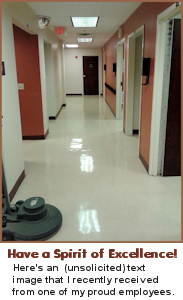In the cleaning business, accusations of janitorial theft are rare, but occasionally, you will get this customer call: “We came in this morning, and widgets were missing from someone’s desk. We’re not trying to accuse anyone, but… only the cleaning people were here last night… so it had to be them.”
Your business has been accused of theft! This is a very serious charge. In fact, it’s #8 (DO NOT STEAL) on the top 10 “DO NOT DO” list, just two below #6 (DO NOT MURDER).
Yikes! How do you handle this situation?

Years ago, a wise man told me, “Drake, do the right thing, and the right thing will happen.”
When your company receives an accusation, the right way to handle it is to empathize with and listen to your customer, get all the facts, get your staff’s input, ask your customer how they would like you to proceed, and then make a decision. The wrong way is to get haughty, angry or blow up at your customer. All that will accomplish is a lost customer, a lost/diminished reputation, lost revenue and possibly criminal charges — even if your business was falsely accused.
I didn’t say doing the right thing is easy, or even comes naturally — but if you want to keep this customer, you have to remain calm and do right by them. Remember, it’s the foolish person that says everything that’s on their mind. Trust me on this one. I’ve played the fool with my mouth more than once, and the wrong thing happened every time.
With that said, and in the hopes of helping someone who may be new to the janitorial industry, I’ll share a few real-life examples of how I’ve responded to accusations of employee theft during my three decades in business.
- Falsely accused of janitorial theft, and vindicated: This is the most common scenario. A customer calls to report that something is missing, and it has to be the cleaning people. You investigate, but soon get a call back noting that the missing item has turned up.
Actual scenario: A client rep telephoned that she left her purse in her desk, and her wallet was missing. She was positive that it was in her purse, so it had to be taken by my staff. I listened more than I spoke, said I would talk with the staff that had been on duty, and told her I’d get right back to her. My employees that night were an elderly husband-and-wife team that I trusted completely. They vehemently denied even going through her desk, much less taking her wallet. A few days later, I received an apology call when the lady’s wallet was found in her car. The couple was relieved that they’d been vindicated, but they didn’t want to work at that site anymore. I didn’t blame them and assigned them to a different client. I also didn’t try to make my customer feel bad or (openly) get upset. Twenty years later, we still have this account, and it is one of the largest and most loyal accounts that we have.
- Falsely accused of janitorial theft, and couldn’t prove otherwise: This is a tricky one. You don’t think it was your staff, but right or wrong, the cleaner is always the first suspect.
Actual scenario: The client, a private school, calls to say that about 10 movies are missing from their daycare classes. Can we check to see if our staff took them, or knows what happened to them? Keep in mind, there are hundreds of kid there, each with backpacks that could easily have the movies in them, but I digress. My staff denied taking them, and I believed them. I said the same to my customer and offered to pay to replace the movies, just to be above reproach.
- Simply informed of janitorial theft: This situation is more likely at larger facilities with hundreds of employees. The customer doesn’t call with a direct accusation, just a notification of a situation.
Actual scenario: The facility manager at a building with more than 1,000 employees calls to let us know that there has been a “trend” developing. Disney trinkets have come up missing from employees’ cubicles. This building has many employees of its own that work there late into the night after our staff has gone, and there are 24/7 security and cameras everywhere. I don’t think the culprit was one our folks, but alerting our whole staff that all eyes and cameras are on them is a good deterrent. Without accusing anyone, we informed our staff and supervisors there to keep their eyes open. By the way, this client is still a beloved customer, and we have a great relationship with them.
- Accused and proven janitorial theft: This has only happened twice to my cleaning company in 28 years. Call it luck, great hiring, or the grace of God –we have been blessed with few occurrences. (I’m going with the grace thing.) I was raised not to air your dirty laundry in public, and I’m a firm believer and practitioner of that philosophy. But because actual theft is so rare and I believe this story will help someone, I’ll share.
Actual scenario: A customer calls, saying that we need to come in and take a look at a video. We meet and watch a video of a new staff member taking $6 off a desk. (It was a teenager that had been recently hired to pull trash.) I was truly shocked, saddened and disappointed to see this. I listened to our client and asked how they would like me to handle it. Of course, the client wanted the employee off of their campus and wanted the money replaced. They did not want to press charges. The employee was terminated from our company immediately. Our client was gracious in not firing us. They said that we were the best service they’d ever had and didn’t blame us personally for one bad apple. I still felt responsible, but grace does abound.
Some perspective… I take pride in running a company based on integrity, honesty and doing the right thing, always aiming to be above reproach and never giving the appearance of wrongdoing. For starters, my staff is highly screened, background-checked, and instructed not to even take a piece of candy off of someone’s desk (even if it has a “Free Take One” sign on it). And I’m pleased to note that over the years my awesome team has turned in lost wallets, cash, cell phones, diamond rings, credit cards, checks, laptops, iPads, jewelry, and the list goes on and on. Out of thousands of employees spanning three decades, the number of janitorial theft accusations has been minuscule, to say the least. I’ve very proud of these good folks!



 To acquire new customers, you spend a lot of time, effort and money to market and sell your services. Once you get a new customer, that’s just the beginning; Now you have to keep them!
To acquire new customers, you spend a lot of time, effort and money to market and sell your services. Once you get a new customer, that’s just the beginning; Now you have to keep them!